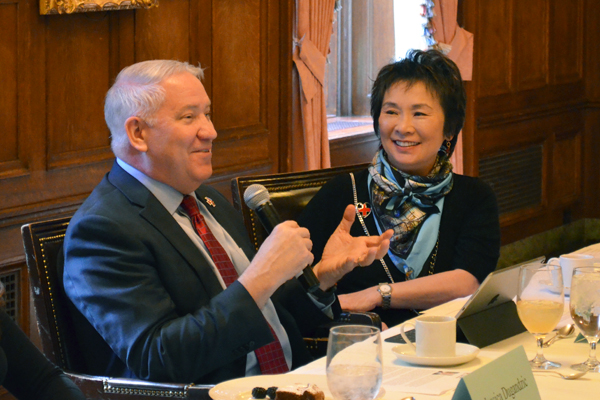 Randall Bagwell and International Circle member Josie Tong.
Randall Bagwell and International Circle member Josie Tong.
The laws of war are clear but the laws surrounding many of our current conflicts today are still unwritten, according to Randall Bagwell, Director of International Humanitarian Law (IHL) at the American Red Cross. Bagwell spoke about the rising numbers of civilians being harmed in current conflicts due to the non-international nature of many conflicts, such as the conflict between the US and IS. Fighters are also not distinguishing themselves from civilians and remain in populated villages, endangering everyone around them. Most nations haven’t ratified additional protocols surrounding these types of conflict, which “makes it increasingly difficult to determine which laws apply to these conflicts and leaves room for governments to take advantage of the gaps.”
Bagwell spoke about American attitudes regarding civilian safety during times of war. He referenced studies from 1999 and 2016 which showed that US citizens demonstrated a greater tolerance towards attacks on civilians in times of war than Russian, French, or British citizens. Bagwell’s explanation for these statistics was that the last war fought on American soil was the Civil War. “America goes to war, war doesn’t come to us. We are vigilant about protecting our soldiers but not civilians.”
One of the most prominent issues in IHL in the last few decades has been torture, particularly after 9/11 when Secretary of Defense Donald Rumsfeld expanded torture tactics. “Torture only works in very specific situations and I have never seen that in real life. You can’t trust information gathered from torture because people will eventually say whatever you want to get you to stop.” An unknown cost of torture is the torturer’s mental health. “The people displayed in movies who seem primed to carry out torture don’t exist. It’s done by 18 year-old boys who end up with PTSD.” The most effective way to gather important information, according to Bagwell, is to simply talk with the person.
